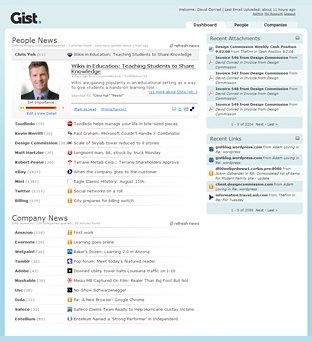For years we’ve been hearing about the problem of information overload. The situation has become so bad that it’s now costing businesses $650 billion per year in wasted productivity, according to a study from Basex released earlier this year. To date, we’ve seen only a handful of real solutions address this issue although none have been what we would call a “killer app.” But now we’ve come across a new tool we want to try: Gist, a web app for organizing your inbox data. We have to admit this one looks intriguing. But will it do the job?

About Gist
Gist, whose slogan is “where your inbox meets the web,” essentially turns your email inbox into a more structured application filled with information while prioritizing the emails that are of the most importance to you. To get started, you connect Gist with your Gmail account. You can also upload a .csv file from either Outlook or LinkedIn. The application then organizes your email and the data extracted from your inbox into a dashboard which gives you a brief overview of the most important items.
The Dashboard & People Pages
On the Gist dashboard, you’ll see lists of recent attachments and recent links in the sidebar, high-priority emails in the middle, and important people on the left. Those people are ranked by you using the service’s rating slider which gives you granular control over the order in which those names are displayed. When you click on any person listed, you’ll see a “people page” that highlights your recent correspondence as well as recent links and attachments, just like the dashboard homepage does.

The People Pages in Gist aren’t just snapshots of inbox activity. They also incorporate other information like news about that person and/or their company. That news comes from a number of sources from across the web, like Yahoo News for example, as well as from recent blog posts. With that information on hand, you have an opening to reach out to them be it to congratulate them on their impressive launch or to simply say how much you enjoyed their recent blog post.
Got The Gist?
We’ve addressed some of the problems with information overload in the past – detailing both the problem and some possible solutions. For email specifically, we looked at five ways to deal with email overload, which focuses on methods like GTD vs. folders and rules. We even looked into some of the applications highlighted at the first IORG (Information Overload Research Group) conference, an event held by the new research group whose founders include IBM, Microsoft, Google, Intel, and others. Unfortunately, no one application has effectively solved the problem just yet.
In a way, Gist reminds us a bit of Xobni (ourcoverage), the Outlook add-in that “socializes your inbox,” by automatically extracting info from both your email and LinkedIn. However, Gist’s ability to grab recent attachments is more like Xoopit’s Gmail add-on (our coverage) that helps you uncover the images, files, and videos you’ve been emailed. Gist really combines the best of both of those plugins and delivers its results as a web application. Clearly, Gist’s service is geared more towards sales professionals, though, as they need to keep up with tons of clients. However, this intelligent application is something that anyone with an overloaded inbox could take advantage of.
Gist’s CEO is T.A. McCann, a Seattle-based former Microsoftie who previously worked in Microsoft’s Exchange Server Group, an experience which no doubt familiarized him with the information overload occurring in today’s inboxes. The company is backed by Paul Allen’s Vulcan Capital.
We Want In!
We would love to tell you want we thought of Gist ourselves instead of just describing its features, but Gist is in private beta, and they seem to be very exclusive about who gets in. We couldn’t even get an invite for RWW! You can sign up for an invite here, so send us one if you get in before we do.










